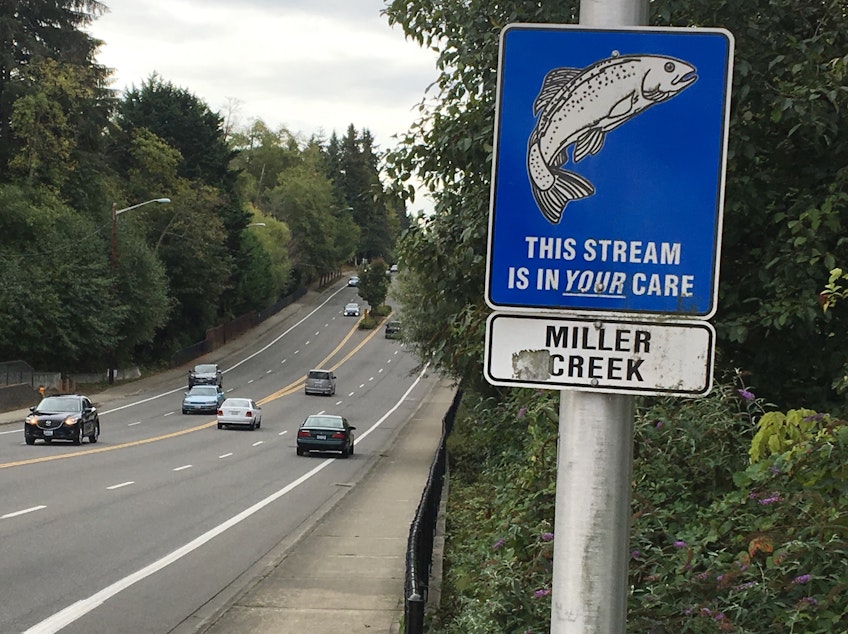Tribes call for national ban on salmon-killing chemical in car tires

Three Northwest tribes have petitioned the federal government to ban a salmon-killing chemical found in tires and urban streams worldwide.
As car and truck tires wear and leave behind skid marks and tire dust, the rubber stabilizer known as 6PPD turns into 6PPD-quinone (also called 6PPD-q), one of the most toxic substances ever evaluated by the U.S. Environmental Protection Agency.
The Port Gamble S’Klallam, Puyallup, and Yurok tribes petitioned the agency on Tuesday to ban 6PPD to save the salmon at the heart of their cultures.
The tribes’ petition says the Environmental Protection Agency is required under the Toxic Substances Control Act to ban the manufacture, import, or use of 6PPD “as soon as practicable” since it poses an unreasonable risk to the environment.
It took decades of research by scientists in Washington state to learn that 6PPD-q was killing coho salmon in urban streams. It could take years more before the harmful substance no longer oozes out of tires and into urban waterways.
“I can imagine it's going to take a long time, but we have to start somewhere. We’ve got to protect our fish,” said Puyallup Tribe Chair Bill Sterud. “It's our treaty right. It's our culture.”
The Puyallup Tribe has experienced the harmful effects of tire debris on salmon more than perhaps any other group.
“A dam operator actually put crumb rubber into our river system,” Sterud said.
In 2020, a construction crew placed two football fields’ worth of artificial turf, made from shredded tire rubber, into the Puyallup River during repair work on the century-old Electron Dam. Turf and tire bits wound up as far as Tacoma’s Commencement Bay, 41 miles downstream.
California officials have designated 6PPD a priority product for replacement due to its toxicity and required tire manufacturers to find safe alternatives.
The Yurok Tribe is California’s largest tribe, with a reservation along the lower Klamath River. In July, the tribe canceled all salmon fishing and announced no salmon would be served at the tribe’s 59th annual Klamath Salmon Festival due to “the precipitous downturn of the Klamath’s once prolific salmon population.”
Facing various threats, coho salmon in California, Oregon, and southwestern Washington are listed as threatened or endangered under the Endangered Species Act.
Spokesperson Kim Kleine said the U.S. Tire Manufacturers Association was still reviewing the tribes’ petition but that it was supportive of efforts to replace the salmon-killing chemical and that tire makers are actively searching for less-toxic substitutes, as California officials have required.
“USTMA members have already started the process to evaluate all potential available alternatives to 6PPD and their performance and environmental impacts,” Kleine said in an email.
6PPD is added to rubber to improve tires’ durability and performance. Almost all tires on the road are 1% to 2% 6PPD by weight.
“Tire composition cannot responsibly be modified without great care, including extensive and rigorous testing,” according to a Tire Manufacturers Association press release in July.
Meanwhile, the nonprofit Center for Biological Diversity is suing Oregon and California for failing to protect salmon from highway runoff containing 6PPD-q.
With more than a billion tires rolling on American roadways, and millions more shredded to make athletic field turf, tire debris and its toxic chemicals will likely continue to make their way into American streams for years.
In addition to changing the recipe for making tires, researchers and government officials hope to reduce the amount of tire gunk finding its way into nearby waters.
Washington state Department of Transportation officials say they are boosting spending to filter and treat runoff at more highway locations around the state. Techniques include using settling ponds, soil, and compost to capture tire dust and other particles before they can reach fish-bearing waters.
Runoff from pavement carries thousands of different, mostly unidentified, chemicals into nearby waterways: from motor oil, antifreeze, brake linings, tire dust, and more.
According to the Puget Sound Partnership, that runoff is the main source of toxic pollution in the sound, where fish in urban bays often develop tumors and lesions.
The 6PPD-q in tire dust is exceptionally toxic to fish and can kill coho salmon in minutes.
“Due to the extreme toxicity of 6PPD-q, even chemicals that are 1,000 times less toxic would still score as a very high hazard,” according to a Washington Department of Ecology report on the search for alternative rubber stabilizers.
In July, researchers at the University of Nevada, Reno, reported that adding recycled tire rubber to asphalt can actually reduce the amount of 6PPD-q that oozes away from roads. Their study, funded by an asphalt producer and published in a peer-reviewed journal, found that the embedded rubber bits absorb much more toxic pollution (from tires passing above) than they release.
“Because so many unknown chemicals are in scrap tires, I am not yet comfortable with the widespread dispersal of these waste materials into the environment,” University of Washington environmental engineer Ed Kolodziej said in an email.
Kolodziej was part of the team of scientists that discovered that 6PPD-q from tires was killing salmon near Seattle-area roads.
“We need a far better understanding of their chemical ingredients and how those many chemicals move out of these materials,” he said.

